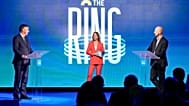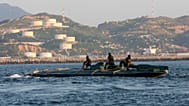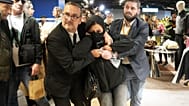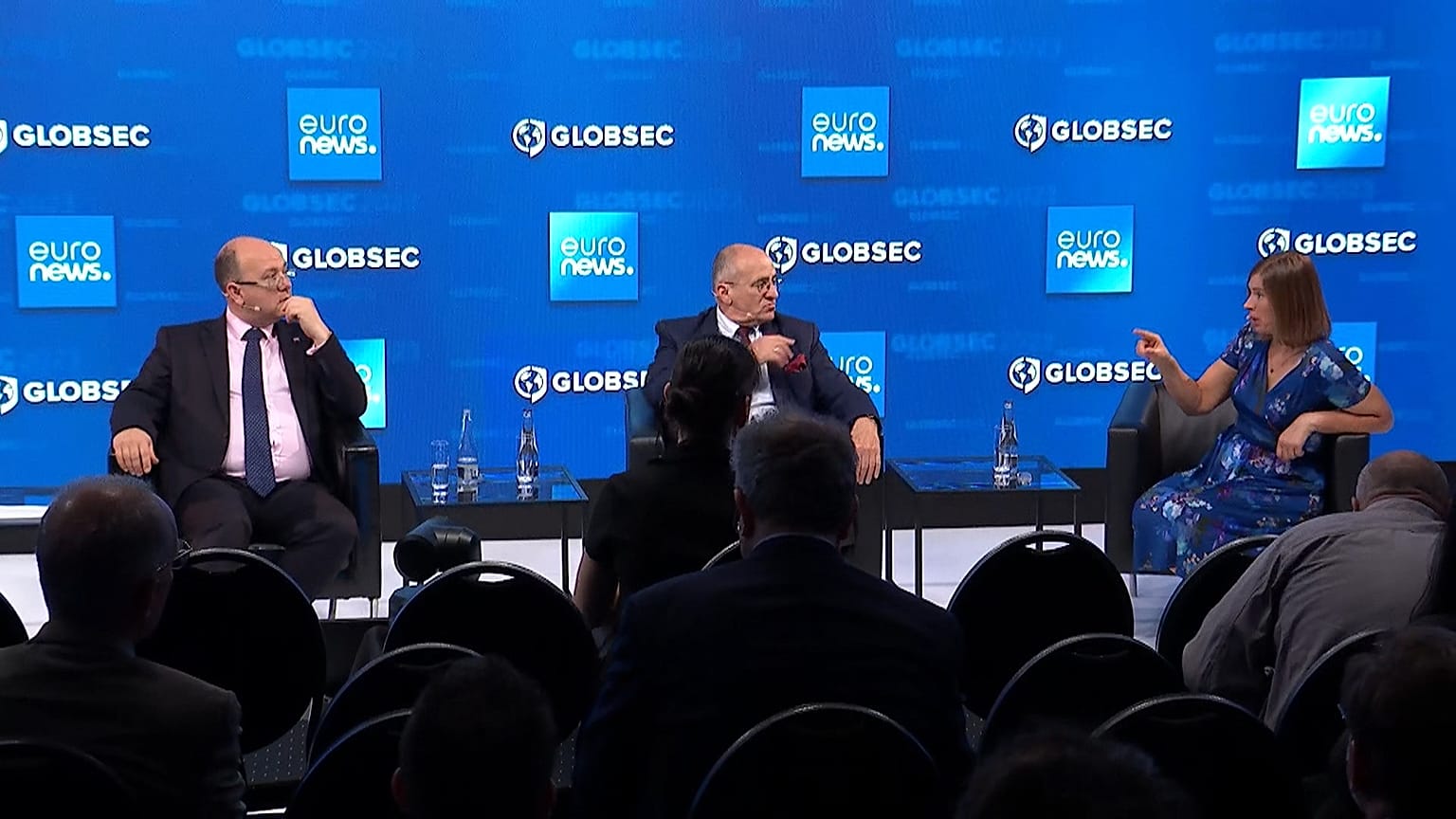Poland and Slovakia's Foreign Affairs Ministers Zbigniew Rau and Miroslav Wlachovsky, alongside former Estonian president Kersti Kaljulaid, joined Euronews for a special conversation on global security from a Central and Eastern Europe perspective, at GLOBSEC in Bratislava.
Euronews
Mr Miroslav Wlachovsky, Foreign Affairs Minister of Slovakia. Then Mr Zbigniew Rau, Foreign Affairs Minister of Poland. Welcome. And Kersti Kaljulaid, who served as the president of Estonia from 2016 to 2021. There are talks, at least at media level, about the possibility of opening a discussion for at least reaching a kind of ceasefire, do you really think that these attempts are credible, or do you think that the peace finally or even a ceasefire, a stable ceasefire, say it will come only after a military failure of Russia in Ukraine, in Ukraine, with the territorial integrity of Ukraine?
Miroslav Wlachovsky
I would repeat myself, but, I said it several times. The easiest way how to reach peace in Ukraine is that Russia will withdraw its forces. I think what we need here, it's not just peace, but just peace. It means that this will be the peace will which will recognise the aggressor and will punish the aggressor and will somehow help the victim. That's what we should aim for. That's how the international law should work and how the international relations should work.
Kersti Kaljulaid
Frankly speaking, all the talks which will say, let's settle now for a ceasefire and then negotiate something back would not work. Imagine we had done the same when the aggression started. What was done in Tbilisi a week or two in this conflict? Where exactly would Russians be? 20 kilometres from Kyiv. Sorry, it has to be: first, Ukrainians clear their territory and then we can talk.
Zbigniew Rau
We are all for peace. We are all for ceasefire. This goes without saying. This is the case from Brazil, I suppose, to India, from France to Estonia or Slovakia or Poland. The issue is what kind of peace do you expect? And I can tell you very briefly what I think about it. The desired peace is a just peace that allows us to restore national independence of Ukraine, state sovereignty, territorial integrity, then reconstruction of Ukraine at the expense of Russia, above all, because Russia is guilty of the destruction of Ukraine and then bringing all those who are guilty of this aggression to justice. If you expect a just and lasting peace, it is to make Russia be not in a position to turn back to its imperial practices in foreign policy.
Euronews
Now we have established that Russia must withdraw and abide by international law. And as long as it won't happen, there won't be any possibility…
Kersti Kaljulaid
I just wanted to say that is a possibility. But it is for Ukrainians to decide. It is for them to decide if they feel that they are ready to sit and negotiate. If they feel confident they are negotiating from the point of strength, there is a chance. So, it's not so bleak [a] picture, I would say. But we cannot decide. It's only the Ukrainians who can decide. I want you to add that.
Euronews
We have seen recently the polemic within the European Union for the grain crisis, the grain import crisis. So, how long do you think your societies will be able to go on in such a kind of emergency situation?
Miroslav Wlachovsky
Well, first of all, it was not our choice. And yes, it is difficult for our countries. But we understand what would be an alternative. And the alternative is much, much bleaker. I mean, no one really wants to be a neighbour of some kind of Putin regime in Ukraine or Putin on our border instead of having as our neighbour, sovereign Ukraine. It's very simple. And I think the price we are paying is high, but still much lower than the alternative.
Kersti Kaljulaid
I was asked this question from my West Berlin friends. Did they feel like living in a militarised country during the Cold War? No, they did not. I mean, being able to defend yourself adds to the security and the feeling of security of people. So, the more NATO presence in [the] eastern flank, the better.
Euronews
Poland, according to what has been said, is called to become a kind of fortress in Europe. The military spending, for instance, of Poland is growing and it's playing a relevant political role now.
Zbigniew Rau
First of all, even referring to yourself, I can say that the Polish Society considers the defence of Ukraine something not only politically correct but something absolutely crucial, even something that we can describe as our existential choice. You see, in the 19th century, when we were deprived of our independence, you couldn't find Poland on the map of Europe, Polish Patriots came up with this kind of motto for your freedom and ours, so, we were well-known freedom fighters in Europe. The point was in the 19th century, and especially also in the 20th century, that we were ready to fight for freedom of others and for others were not very often ready to fight for our freedom. And now what we experience in this war is that there is a country, namely Ukraine, that in fact is fighting for our freedom, whether it's [the] freedom of Slovakia, Estonia and Poland. When you are asking about the role that Poland is playing now on the eastern flank, certainly we believe as a NATO ally that the level of military spending in the alliance should be at 2% of GDP. Let me put it this way, [it should be] the floor, rather than the ceiling. And this is for this is the reason why we believe it's correct to spend right now slightly more than 4% of our GDP this year. But nevertheless, when more than three 3% because I suppose that the very notion of an effective alliance is to consider ourselves. And I think that this is also the case, it should be the case with any other country, a NATO member, [we should] consider ourselves not only as a recipient of security but also as providers of security, that's the reason. That it is the way we decide to spend this much, because the philosophy behind it is that I am going to help you. First of all, you have to be in a position to help yourself, defend yourself first and then defend others, your neighbours too.
Euronews
Do you think that you have enough understanding and support from the other European partners when it comes to the European Union and also many of them are also NATO partners ... Do you think they understand you completely and do you feel that they are supporting you or there is always some ambiguity or something that is not clear when it comes to European Councils or a Council of ministers or NATO meetings and so on, so forth.
Kersti Kaljulaid
You know, I am a market economist. The 'market's always right'. And if I look at how reluctantly the industry is investing against the bet that there will be long-term need for ammunition, cannons, tanks, etc. I initially thought that the industry has gone lazy, just looking for guarantees everywhere and so on. But in the year which has passed, the more I talk to them, their prediction is that the willingness to spend more on military equipment is short-lived and it might be over as soon as the war is over or soon after that.
Euronews
Minister [Rau] .
Zbigniew Rau
Well, I suppose that you are raising the fundamental issue here because within the NATO alliance, we always talk about unity…
Kersti Kaljulaid
United in weakness, you mean?
Zbigniew Rau
No, it's not a matter of weakness. It's more a matter of not doing anything. We on the eastern flank think about it in a different way. We have to meet the challenge. And those of us who [are] most sensitive to this challenge, given our geopolitical situation, given our historical experience and so on. We feel obliged to set the agenda, to make this unity simply dynamic, to make it meet with the challenges Just take, for example, that we can manage to build a tank coalition. We decided to send first the fighter jets and so on and so on. Yes. It's a matter of showing the goal to which we should all go in order to in order to achieve it. So, this is a dynamic kind of unity within NATO, really, and also the European Union needs.
Euronews
Thank you. Mr Wlachovsky, I would like also to say one thing. This is true for the Baltic countries and for Poland. For Slovakia, the situation is a little bit different considering the figures.
Miroslav Wlachovsky
When we are talking about numbers and about the people, I think there is an important word which is called leadership. And the leadership means that you lead despite the numbers and you have to find a way how to convince people that's really important. But here in this country, the government took important decisions because they thought and I agree with them, it was the right thing to do. Basically, that was it. And it was in the interest of not only Slovakia, but the whole region.
Euronews
Not really popular decision according to the figures.
Miroslav Wlachovsky
Well, there are many unpopular decisions which must be made, you know, and this might be one of them. But I am proud that we were able to do them. And I think it's not difficult to make a tough decision when everybody agrees. It's difficult when a lot of people disagree to make a right decision.
Euronews
The title of this debate is “Leading from the Centre”, but don't you think that this leadership from the centre is a kind of 'lame duck', because, for instance, there are some black holes. Let's talk about a very important absence here. Hungary, for instance. That should be a masterpiece of the (construction).
Kersti Kaljulaid
Maybe indeed, we should always take this kind of lowest common denominator and say we have actually disintegrated from the European Union because there was Brexit. I mean, this is exactly the argument you are making, just the fact that one of the Central and Eastern European countries is playing a different game, showing us how the world would look like if there were no kind of rules-based but interest-based, world view only, not even order. I mean, it's not fair to us, because we are leading by example. We are spending. We are trying to defend ourselves as much as possible. We are speaking politely, but honestly where we are. We also, I mean sharing honestly and openly our worries that we are not all on the same page and we are having success.
Euronews
And…because in the European Union, anyway, Hungary when it comes to other issues that are not related to security, is a kind of good support for the position of Poland when it comes to the civil rights and rule of law in this kind of issues.
Zbigniew Rau
Are we going to lead in the same way Germany wants to lead Europe? Certainly not, especially not us in Poland, because we believe, in something very fundamental that all EU member states are free and equal in the same way, and the interests of each of us should be represented in the same way.
Euronews
Well, I was about to take a question from Slido now. It's about, It was about the 2% of spending. The question was about the fact that is it illogical to speak to talk about the strategic autonomy of a European Union when a lot of countries are not reaching the 2% of their spending (on military)? So, the military issue is not a priority for them.
Miroslav Wlachovsky
For me, it's not about the structures. For me, it's about the capabilities and the capabilities to act when it's needed. And I must say that I am a big supporter of the transatlantic link and of NATO as a defense alliance. But I fully understand the wish of our American allies and our American friends. “Please, Europeans be able to deal with these issues on your own when it's necessary. And for that, we need those capabilities.
Kersti Kaljulaid
In order to project, project power, in order to have influence in the neighbourhood, one needs capabilities, by citation from the High Representative (Borrell). So, the West and East know. But of course, there is a slight discrepancy in that some are talking about strategic autonomy and some are spending and they are not necessarily the same people.
Euronews
Well, the spending is the question coming from slide two. But I guess that the idea was anyway strategic autonomy from NATO and from the United States. I guess that for your countries, this is not the real-life insurance.
Kersti Kaljulaid
But I have never heard it this way. Spoken also by those who invented the term in terminology I've never heard, let's say Nathalie Tocci, or Emmanuel Macron, or Federica Mogherini to say this is what we are doing in order to be not more independent from the US. They've always said we are doing this to be able to support US's global ambition, to defend the free world. But we have to be able to do something ourselves. And there have been lots of misunderstandings. Some words will turn into rude words. It's not our fault, but the concept is materially right.
Zbigniew Rau
If the European Union believes that it is a global player, responsible for a big geopolitical situation in the world, and if it considers itself a defender of values of the free world, it cannot stay indifferent to the situation in its backyard.
Euronews
Do you think that the most practical way to reconstruct Ukraine, would it be a Ukraine on the waiting list to join the European Union or to start the reconstruction with a Ukraine within the European Union as a member? From a purely, say, practical point of view. And if it's politically viable or economically viable, what do you think? This is the question for the three of you.
Kersti Kaljulaid
The fact is that for Ukraine to join the European Union, the leaders of the European Union have to be able to tell to their companies and businesses, invest there like you would invest in your own country. The economic environment is the same. Your investment is protected the same way. The rule of law is established the same way. This has not been the case in Ukraine before the war, and I hope they can quickly overcome the difficulties which they had before. And then, of course, they can join, because the EU is an economic union. And we have also this aspect that we cannot just politically decide: “come inside, we will reform afterwards, because we have to give this message to our business skills and invest there”.
Miroslav Wlachovsky
I really strongly hope that we will start with reconstruction of the Ukraine before they join the European Union, because I want to start the reconstruction of Ukraine really quickly. The precondition for that is the war will end. And in the meantime, we have to prepare and we have to find a way how to find the best way, how to help them to reconstruct their country.
Zbigniew Rau
Quite frankly, I suppose the best way to proceed is to launch these two processes in a parallel way.
Euronews
Double track?
Zbigniew Rau
Double track. Indeed.














